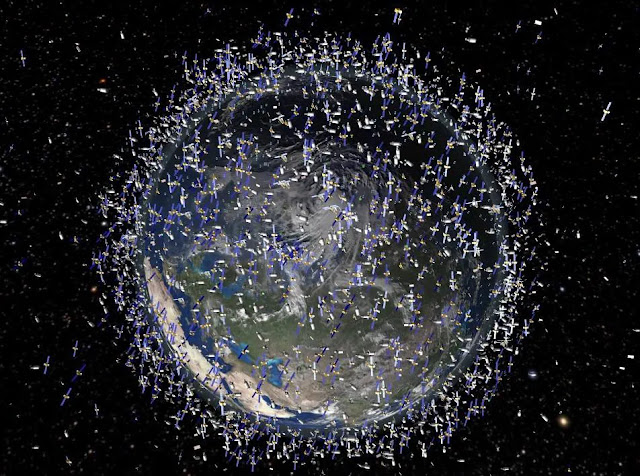Look Up Space logo.
April 3, 2023
A newly created company is betting on the “crucial” issue of space surveillance.
Earth is surrounded by space debris. Image Credit: ESA
Space debris by the thousands, proliferation of constellations and slightly too curious machines approaching certain satellites: space surveillance is a "crucial" issue for its sustainable exploitation, believes Michel Friedling, former space commander French and founder of Look Up Space. The start-up, created last summer, intends to become “one of the world leaders in space surveillance and security of activities in orbit”, displays General Friedling, in an interview with AFP.
Its co-founder, the former head of the space surveillance service at Cnes Juan Dolado Perez, “masters the issues related to the risks posed by debris”. Michel Friedling was able to observe as the first boss of the French “Space force” “the emergence of orbital threats and irresponsible behavior”. “Today, flying in orbit means driving blind in the wrong direction on the highway,” he explains. Both of us in our journey have been struck by the rise of these risks and threats.”
Thousands of collision alerts
The European Space Agency (ESA) has counted 36,000 pieces of debris larger than ten centimeters and one million larger than one centimeter orbiting the Earth at 28,000 km/h. Seven times the speed of a rifle bullet. And the number of satellites launched continues to climb, driven by the rise of constellations of communication or observation satellites.
"When I took office in 2018, there were 1,800 active satellites in low orbit, when I left them in 2022 there were 6,000, of which 2,000 were put into orbit in the first six months of the year", he relates, “and we expect tens of thousands of them before the end of the decade”. This generates “already tens of thousands of collision alerts per year”, leading to avoidance maneuvers, altering the life of the satellite.
It is also necessary to keep an eye on space objects coming to harass strategic satellites, a subject of growing concern in a context of "weaponization" of space. In 2020, the Russian satellite Cosmos 2542 thus approached an American spy satellite KH-11. Three years earlier, Paris had revealed that another Russian snooping satellite, Louch-Olymp, had come to "forage" near the Franco-Italian military satellite Athena-Fidus.
Holes in the catalog
To monitor space, the French army has its own GRAVES radar, which can only see objects several tens of centimeters and “when they pass above”. It also has access to Arianegroup's eight GeoTracker telescopes; radiofrequency data emitted by satellites collected by Safran; as well as the US Orbit Object Tracking Catalog, which omits some sensitive US satellites.
If "optical technology offers interesting things", "you don't do air traffic control with binoculars and telescopes, you do it with radar", he pleads. With its network of seven radars by 2030, all located in mainland France or in overseas territories to cover the entire sky permanently, Look Up Space therefore intends to provide a "complementary architecture" to the means of State and sell its services from 2024 to public players and private operators alike.
The company, "strongly supported" by the public authorities, is counting on the ongoing fundraising with the Cosmicapital and Expansion funds, to be on the way to raising the fourteen million euros necessary to deploy a first surveillance radar at the end of 2024. of space, its digital architecture and the software bricks.
Permanent monitoring
"Radar technology is the only solution that allows for permanent surveillance, capable of detecting objects a few centimeters wide and accurately calculating possible collision trajectories," argues Michel Friedling.
Look Up Space is not the first on the market, the American LeoLabs, with its ten operational radars, has "one step ahead", he concedes, and the French Ministry of the Armed Forces is "in the process of negotiate service purchases from LeoLabs”.
Waiting for a sovereign French solution? Michel Friedling is convinced of this: "It's a fairly heavy trend, today the policy at French and European level is to promote the emergence of a commercial sector in support of public action and responding to needs that public action cannot meet”.
Related articles:
NASA study assess costs and benefits of orbital debris removal
https://orbiterchspacenews.blogspot.com/2023/03/nasa-study-assess-costs-and-benefits-of.html
The Progress spacecraft took the ISS away from space debris
https://orbiterchspacenews.blogspot.com/2023/03/the-progress-spacecraft-took-iss-away.html
Russian satellite breaks up in orbit, generating cloud of debris
https://orbiterchspacenews.blogspot.com/2023/02/russian-satellite-breaks-up-in-orbit.html
Two big pieces of space junk nearly collide in orbital 'bad neighborhood'
https://orbiterchspacenews.blogspot.com/2023/01/two-big-pieces-of-space-junk-nearly.html
Russia to launch mission to rescue stranded ISS crew after meteoroid strike
https://orbiterchspacenews.blogspot.com/2023/01/russia-to-launch-mission-to-rescue.html
The current state of space debris
https://orbiterchspacenews.blogspot.com/2020/10/the-current-state-of-space-debris.html
The cost of space debris
https://orbiterchspacenews.blogspot.com/2020/05/the-cost-of-space-debris.html
CleanSat: new satellite technologies for cleaner low orbits
https://orbiterchspacenews.blogspot.com/2015/01/cleansat-new-satellite-technologies-for.html
The number of space debris reached a "critical point"
https://orbiterchspacenews.blogspot.com/2011/09/number-of-space-debris-reached-critical.html
Related links:
Look Up Space: https://www.lookupspace.com/
LeoLabs: https://leolabs.space/
Cost and Benefit Analysis of Orbital Debris Remediation: https://www.nasa.gov/sites/default/files/atoms/files/otps_-_cost_and_benefit_analysis_of_orbital_debris_remediation_-_final.pdf
Image (mentioned), Text, Credits: AFP/Orbiter.ch Aerospace/Roland Berga.
Best regards, Orbiter.ch


